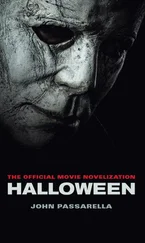The drive was both longer and faster than Ford would have preferred. It was late afternoon by the time he found himself sitting in the austere waiting area of a Tokyo police station. Stark institutional walls and sparse furniture rendered the room inhospitable, not that anyone was ever likely to drop by for the amenities. Wanted posters and security alerts were pinned to a bulletin board. Ford tried flipping through some old magazines, only to discover that his Japanese wasn’t what it used to be, despite the long-ago efforts of Miss Okada. He glumly watched a parade of cops and perpetrators pass in and out of the station. He would’ve killed for a cup of black coffee, but that didn’t seem to be an option.
A middle-aged couple, their faces drawn, sat stiffly in the seats beside him. They looked about as happy to be here as he was, although he guessed that they hadn’t traveled nearly so far. Ford didn’t have the energy to try to make conversation with the couple, who appeared caught up in their own troubles anyway. They gripped each other’s hands as they waited. He wondered how long they’d been married.
A buzzer sounded and an inner door unlocked. Ford and the couple looked up to see a bedraggled teenager, decked out in Goth regalia, escorted into the waiting room by a duty cop. The boy’s Mohawked head was hung in shame and he stared at the floor, unable to meet his parent’s gaze. The black mascara around his eyes was smeared, as though he’d been crying. The teen’s mother placed a hand over her mouth, stifling a sob.
The father, a sober-looking gentleman in a conservative suit and tie, rose to face his errant son. The older man regarded the teen in silence for a moment, his stony face unreadable, then came forward to hug his son. The boy collapsed against his father, weeping and apologizing for whatever offense had landed him in the hoosegow. His mother, also forgiving, joined her husband in assuring the teen that, no matter what, he was still their son.
Maybe it was just the jet lag and lack of sleep, but Ford was moved by what he witnessed. He watched enviously as the trio departed the station together. That was what a family was supposed to look like. Not like…
“Been a while,” Joe Brody said.
Ford looked up to see his father standing before him, unkempt and disheveled from a night behind bars. He was rake-thin, having lost weight since the last time Ford had seen him, and there was more grey at his temples than Ford remembered. Stubble carpeted his face. If anything, he looked like he’d been sleeping worse than Ford. Heavy pouches shadowed his puffy, bloodshot eyes.
Caught up in someone else’s family drama, Ford hadn’t even noticed his dad being led in. Father and son stared at each other awkwardly, both of them searching for a place to begin. It had been a long time since they had known how to talk to each other, or been entirely comfortable in each other’s presence. Ford suddenly envied that Goth kid.
Unable to find the right words, Ford just held out his hand to shake.
It was the best he could do.
* * *
A partial view of downtown Tokyo from one small window was the only selling point of the cramped and cluttered garret Joe Brody currently called home. It was dusk and neon lights filtered in from outside as Ford and his father entered the apartment. Ford glanced around dubiously. This dump was a far cry from the cozy suburban home he had once shared with his parents — in what was now a radioactive ghost town.
“I’m sorry you had to come all this way, Ford,” his dad said. Joe stepped over tottering stacks of books, magazines, and newspapers piled high on the floor. A single beat-up futon was littered with dirty laundry. Crusty plates and dishes were heaped in the sink of an adjacent kitchenette. An open doorway revealed an unmade bed. The stuffy atmosphere was badly in need of air freshener. Joe avoided Ford’s eyes. “Couldn’t you have just given them a credit card?”
I wish , Ford thought. Bailing his dad out wasn’t the issue here. It was the fact that Ford had needed to do so in the first place.
He refrained from saying so. The awkwardness between them had not gone away during the short drive here. Joe flipped on a light, igniting a naked bulb hanging from the ceiling, and Ford got a better look at what his father’s life had become.
It was a lot to take in. The apartment was more than just a mess. It was a lunatic’s hoard of papers, maps, books, notes, photos, Post-its, and graphs occupying every available surface, including the walls. Tangled cables, snaking across the floor, connected a bewildering array of antique computer monitors, old TV sets, battered printers, and used mainframes that looked as though they should have been consigned to a junk heap years ago. There was even a VCR and VHS tapes for Pete’s sake. To Ford’s eyes, it was a chaotic flurry of random data, accumulated by someone driven round the bend by an obsessive search for answers. Ford dimly remembered how neat and well-ordered his father’s home office had once been, before the meltdown, and winced at the disorderly rat’s nest before him. Joe Brody had been a respected engineer, a professional, many years ago.
Ford wasn’t sure what his father was now.
Joe caught Ford staring silently at the clutter and disarray. He feebly attempted to tidy up, relocating some discarded clothing from the futon to a closet and clearing a path through the heaps of books and magazines. A knee-high stack of newspapers toppled over, spilling onto the floor.
“PhDs don’t make much teaching English as a second language,” Joe offered by way of explanation for his low-rent accommodation. He waited in vain for Ford to say something, then continued. “How’s the bomb business? That must be a growth area these days.”
Ford was irked by his dad’s remark. “It’s called explosive ordinance disposal. And my job isn’t dropping bombs. It’s stopping them.”
His gaze was still riveted by the insane accumulation of information pinned and taped to the walls. Looking closer, he spied decades-old news clippings about the meltdown, maps of the quarantine zone, and what appeared to be clandestine spy-photos of tall razor-wire fences and armed sentries on patrol. Ford frowned. He had a pretty good idea who had taken those amateur photos.
“How’s Elle doing?” Joe asked, in a transparent attempt to divert Ford’s attention from the walls. “Sam must be, what, two already?”
“Almost four.” Ford didn’t feel like talking about Sam. He made his way across the clutter to a second-hand desk that was practically buried beneath a surplus of scientific tomes. Bookmarks flagged key sections. Notes had been scribbled in the margins. “I thought you were over this stuff.” He sorted through the books, looking over the titles and chapter headings. He picked one after another up, trying to make sense of it all. “ Echolocation. Parasitic Communication Patterns. ”
Joe took the book from Ford. “Homework,” he said with forced casualness. “I’m studying Bioaccoustics. My new thing.”
As though that explains everything , Ford thought, losing patience. He was too tired and fed up to beat around the bush any longer. He turned away from the desk to confront his father.
“Dad, what the hell were you doing?”
“Ah, that trespassing stuffis nonsense, Ford.” Joe waved it away with a dismissive gesture. “I was just trying to get to the old house—”
“It’s a quarantine zone!”
“Exactly!” Joe’s casual pose fell away, revealing what was really driving him. “That’s exactly it — there’s something happening in there, Ford. I’ve seen pictures. They didn’t quarantine that place because it’s dangerous. They’ve got something going on in there. The new readings are exactly like they were on that day, and if I can just get back in before it’s too late—”
Читать дальше












